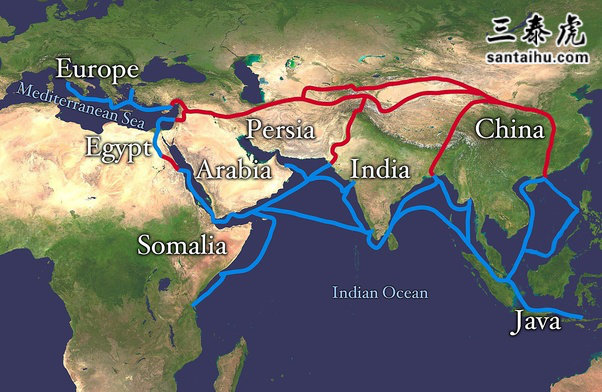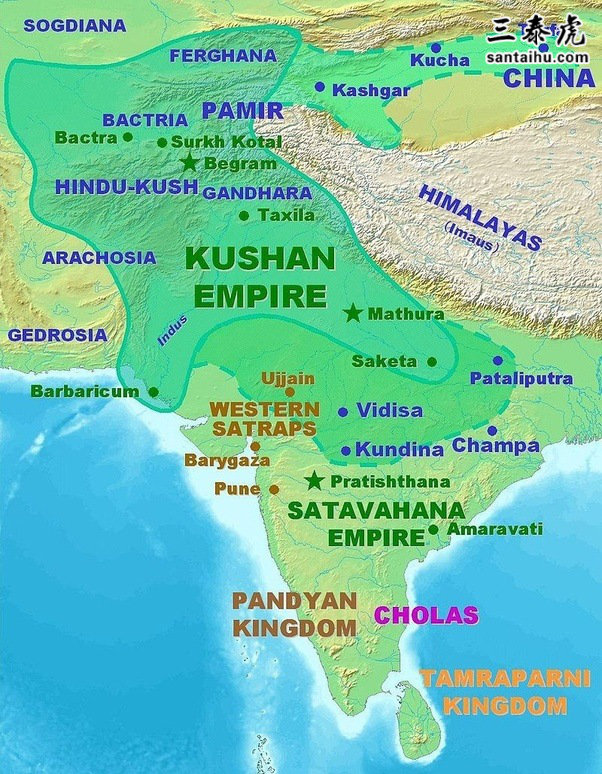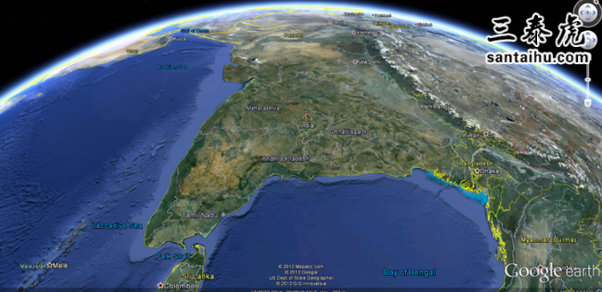中印在历史上曾经是朋友吗,印网友:古印度从中国进口糖
Have China and India ever been friends during any point in history?中国和印度在历史上曾经是朋友吗? Quora读者的评论:Anil
Have China and India ever been friends during any point in history?
中国和印度在历史上曾经是朋友吗?
Quora读者的评论:
Anil Bharadwaj, I eat Global Times for Breakfast
Before the mid-1940’s, neither China nor India existed as states we see and talk about today. So the question is kind of misplaced on one count.
India could get serious with the Westphalian order only after its independence from Great Britain in 1947. Without a Westphalian yardstick, it is hard to gauge the quality of relations and diplomacy between the two states by contemporary standards.
So I intend to specifically exclude the period of British Raj in India. If we were to count that, (British) India and China sat down as opposing belligerents in the Opium War. This again, is owing to the fact that India was not acting on its own agency and merely under a subjugated authority. The same is the case with the Boxer Rebellion.
But again, under the same British Raj, India and China fought against Japan in the Battle of Hong Kong. The euro-centric narrative celebrated the valour of British and Canadian forces conveniently ignoring the efforts of Indian and Chinese regiments. But India and China stood for each other in the battle. This was in the year 1941, 21 years in the run-up to the Sino-Indian war.
This piece of forgotten history has been very indicative of (and instrumental in) shaping up both the countries’ unanimous anti-imperialist and socialist stances leading up to Indian independence in 1947 and the Communist Revolution in China spanning 5 years in the mean time.
Rewinding back further into history, India and China had significant trade relations, with renewed zeal from time to time. This is a map of trade network that India was a part of. Notice how deep into the southern part of Indian subcontinent the trade route has permeated.
在20世纪40年代中期之前,中国和印度都不是我们今天看到和谈论的样子。所以这个问题有点错位。
印度在1947年脱离英国独立后才正式采用维斯法阶。没有维斯法阶就很难用当代的标准来衡量两国关系和外交的质量。
所以我打算把英属印度统治时期排除在外。如果我们算上这一点,(英国)印度和中国在鸦片战争中就处在对立面。义和团运动也是如此。
但在同样的英国统治下,印度和中国在香港之战中对抗日本。而以欧洲为中心的历史记录则颂扬了英国和加拿大军队的英勇,而忽略了印度和中国军队的努力。但印度和中国在这场战斗中相互支持。那是1941年,中印战争爆发前21年。
回顾历史,印度和中国有着重要的贸易关系,两国关系回暖升温。这是一张印度参与的贸易网络地图。注意看印度次大陆南部的贸易路线有多深入。
This was called the Ancient Silk Road. Does this remind you that history can repeat and is repeating?
Except that India of the 21st Century, being the big bitch that she is according to the Chinese media, does not want to participate.
India was an entrepot zone for Central Asian, Greek and Arab buyers of Chinese products, that mainly included Chinese Cloth and Bamboo products.
Ancient silk route was bustling with trade until the Mongol Empire started to fragment and disintegrate. Trade Emissaries from China to South Asia continued after that during the Ming Dynasty, but not in the way trade prospered when Silk Route was in vogue.
There exist records of Tamil Hindu Traders settling in Quangzhou during the reign of Yuan Dynasty.
Behind China’s Hindu temples, a forgotten history
Funnily, in those times, apart from the face, a person was recognised to be from South Asia, based on his vegetarian habits, a timeless legacy I am proud to carry it myself.
The Chola Dynasty in particular conducted a great deal of diplomacy with the Chinese. The maritime part of the Silk Road, stretching from Indonesia into the north of the China sea, was taken into control by conquering the Sri Vijaya Empire. By modern standards, a Navy projecting power through commerce into the China Seas could, in all fairness, be called a Blue Water Navy and the Cholas maintained one. Whatever it is, the Cholas of India and the Song Dynasty of China have had their priorities right.
Politically, the only empire the tried to foray into the Chinese territories was the Kushana Empire, extending as north and east into Central Asia as Kashgar, Xinjiang.
这就是古丝绸之路。这是否提醒了你,历史可以重演,而且正在重演?
印度是中亚、希腊和阿拉伯国家从中国采购商品的转口地区,主要采购的是中国的布料和竹制品。
古代丝绸之路贸易繁荣,直到蒙古帝国才开始分裂和瓦解。明朝以后,中国继续往南亚派出贸易使节,但不复丝绸之路鼎盛时期的繁荣景象。
有记载称,元朝时期,泰米尔印度教商人在泉州定居。
在中国的印度教寺庙背后,是一段被遗忘的历史。
尤其是在乔拉王朝时期,印度与中国进行了大量的外交活动。丝绸之路的海上部分,从印度尼西亚一直延伸到中国南海的北部,通过征服斯里维加亚帝国而得到了控制。按照现代标准,一支通过商业活动向中国海域宣示实力的海军,平心而论,可以被称为深海海军,而乔拉斯号就拥有这样一支海军。不管是什么原因,印度的卓拉家族和中国的宋朝都有自己的优先考虑。
唯一一个试图入侵中国领土的帝国是Kushana帝国
Till date, except for Jawaharlal Nehru insisting that India retains trading rights in Tibet be held by India with the newly form PRC, there is historically little evidence that any King or Emperor ever toyed with the idea of pushing the borders further north ruling from South Asia, including the British themselves.
Culturally, India was a net exporter of soft power into China, a very peculiar phenomenon for India/South Asia. So far in history, India is characterised by how it internalised elements of every other foreign culture, except for China. While the proselytisation of Buddhism along the Silk Route was a given, by far, it was only a one way street, for over two millenia.
至今为止,除了贾瓦哈拉尔·尼赫鲁坚称印度在印度还有贸易权,历史上几乎没有证据证明有任何国王或皇帝,包括英国在内,想将国界线从南亚进一步往北推。
从文化上讲,印度是对中国输出软实力的净出口国,这对印度/南亚来说是一个非常奇特的现象。迄今为止,印度的特点是,除了中国,它将其他所有外国文化的元素都内化了。虽然佛教通过丝绸之路传播,但到目前为止,在两千多年的时间里,还只是一条单行道。
Sayan Dey, Indian | Blogger | Space Lover | Sports | Photography
Obviously, not friends if you are taking that term literally but that we had good relations with China from quite an early age is quite evident.
That Buddhism could spread to the greater parts of Asia was due to the acceptance of it by the Chinese, which could only be possible if there was mutual respect and trust between the people of the two nations (or kingdoms), so to speak.
Also another instance, I can readily recollect at this stage is Bodhdharma, the founder of Shaolin Kung Fu. He was an Indian from the southern part of the land (South India) who went there and taught the Chinese Shaolin. Apart from that, he was alos a Buddhist monk and he is credited with spreading the Chan Buddhism in China.
So basically, I can see two examples, one from the northern part and the other from the southern part, influencing the Chinese in a big way and you can definitely make up without good contact between the two civilizations, this really wouldn’t have been possible.
显然,如果你从字面上理解的话,两国并非友邦,但我们在很早的时候就与中国建立了良好的关系,这是很明显的史实。
佛教之所以能够传播到亚洲的大部分地区,是因为中国人接受了佛教。可以说,只有在两国(或两国)人民相互尊重和信任的情况下,佛教才有可能传播到亚洲。
还有一个例子,我可以很容易地回忆起菩提哈玛,少林功夫的创始人。他是一个来自南部的印度人,他去中国教授少林功夫。除此之外,他还是一位佛教僧侣,他被认为是在中国传播禅宗的功臣。
所以基本上,我可以看到两个例子,一个来自北方,另一个来自南方,在很大程度上影响着中国人,如果没有两种文明之间的良好接触,这是不可能的。
Gabriel Chan, well-read
"India conquered and dominated China culturally for 20 centuries without ever having to send a single soldier across her border"
— Hu Shih, Former Ambassador of (Republic of) China to USA
Mr. Hu was referring to Buddhism and how Chinese saw the West (India) as a heaven or holy place. It's not friendship but India was highly regarded in China.
“印度在文化上征服和统治了中国20个世纪,从来不需要派遣一名士兵越过边境。”
——胡适,前中国驻美国大使
胡先生在这里说的是佛教以及中国人如何将西方(印度)视为天堂或圣地。这不是友谊,而是印度在中国被高度重视。
Thanos, Software Engineer (2017-present)
India and China don’t share a real border. Himalayas separate each of them. So, people to people contact never happened.
North East of India, which shares a small border and cultural similarities with China, is actually not the real India. We got them from British and still think they are like us.
Some south Indian states had some influence in south East Asia. But, the contact between India and China was never very close. You can find Tamils in Indonesia and Singapore. But unlike ethnic Chinese, they are not so influential or could not act as a bridge.
However, Buddhism started in North India and it spread to China. But, in India Buddhism never became a mainstream religion and many Buddhists disappeared after Islam arrived. You can say there is some similarity in religion.
If you look at history of India, India never had any friends. Invaders came from west with a strange religion and never returned back. Middle east got some food from us, central Asia used to be place for our trade.
印度和中国没有真正的边界。喜马拉雅山脉将它们分开。所以,人与人之间的接触从来没有发生过。
印度东北部与中国有着很小的边界和文化上的相似之处,但它实际上并不是真正的印度。我们从英国人那里学来的,现在还认为他们和我们一样。
印度南部的一些州在东南亚有一定的影响力。但是,印度和中国之间的联系从来都不是很密切。你可以在印度尼西亚和新加坡找到泰米尔人。但与华人不同的是,他们没有那么大的影响力,或者不能起到桥梁的作用。
然而,佛教起源于印度北部,并传播到中国。但是,在印度,佛教从未成为主流宗教,许多佛教徒在ysl教到来后就消失了。你可以说宗教有一些相似之处。
如果你回顾印度的历史,你会发现印度从来没有任何朋友。侵略者带着一种奇怪的宗教信仰从西方来到这里,再也没有回来过。中东从我们这里得到了一些食物,中亚曾经是我们贸易的地方。
Deepak S Fernandes, Born in Bahrain, ex-Indian citizen, now a Polish citizen
Both “China” and “India” in the modern sense are very new countries — The Republic of India dates from 1947 and the People’s Republic of China from 1949.
Until that point in time, there was no large border between the lands.
What you are referring to in your question is between the two civilizations.
The two civilizations have been “friends” since Ashoka’s time when Emperor Ashoka sent Buddhist missionaries to China.
For most of the time, the two civilizations never “touched” each other directly — always separated by Kushans, Turkics, Mongols, Tokharians, Bactrians, Sogdians, Tibetans, sea, mountains.
现代意义上的“中国”和“印度”都是非常新的国家——印度共和国成立于1947年,中华人民共和国成立于1949年。
在那之前,两国之间没有大的边界。
你问的是关于两种文明之间的问题。
自阿育王派遣佛教传教士来华以来,两大文明一直是“朋友”。
在大多数时间里,这两个文明从来没有直接“接触”过——总是被库珊、突厥人、蒙古人、托斯卡纳人、巴克特人、索迪亚人、大海和高山分隔开来。
Sunny Lyngdoh, former Research Manager at IMRB International (2012-2014)
Firstly, two nations can never be friends in the true sense of the term, simply because they can never trust each other the way friends do. Yes, they can be allies or partners and have friendly relations.
Coming to India and China: political, economic and cultural relations have existed between the two regions for over 2000 years (although not as much as one would expect between two neighbours) and in general the atmosphere has been one of mutual interest and cooperation. Even today, despite the China-Pakistan axis, the 1962 war, the border disputes, China is India’s largest trading partner.
There is not much to say with regard to military cooperation: the only instance that comes to mind is WWII, when the Allied Powers used India as a base in supporting China against Japan.
首先,两个国家永远不可能成为真正意义上的朋友,因为他们永远不能像朋友那样互相信任。是的,他们可以成为盟友或伙伴,有友好的关系。
来谈谈印度和中国:两国之间的政治、经济和文化关系已有2000多年的历史(尽管没有人们所期望的两个邻国之间的关系那么融洽),总的来说,两国的气氛是互利与合作的。即使在今天,尽管发生了中巴轴心、1962年战争、边界争端,中国仍然是印度最大的贸易伙伴。
关于军事合作没有太多可说的:唯一让我想到的是第二次世界大战,同盟国利用印度作为基地支持中国对抗日本。
Kuntal Sarma, The Purpose of History is a better world
Even though Indian and the Chinese civilizations existed alongside for thousands of years, it had a very little to do with each other. Reason being the existence of the Himalayan range, which forms a natural border, as seen in the satellite image.
The cultural and linguistic influence was limited too. Some examples would be, ancient India used to import sugar from China, that is why the Hindi word for sugar is ‘Chini’. An alternate word for Sugar is ‘Shakkar’, as used by some north Indians. It is derived from Persian word ‘Shekar’ which means sugar.
On the other hand, Buddhism which originated in India was accepted by the Chinese more. Chinese Buddhist pilgrims used to visit Bodh Gaya (Birth place of Gautama Buddha) and also to learn different forms of meditation techniques in Nalanda (ancient Indian university).
尽管印度文明和中国文明共存了几千年,但它们之间的关系却非常淡泊。原因是喜马拉雅山脉的存在,形成了一个自然的边界,从卫星图像中就可以清楚地看到。
文化和语言的影响也很有限。例如,古印度曾经从中国进口糖,这就是为什么印地语中糖是“Chini”。糖的另一种说法是“Shakkar”,一些北印度人到现在还这么说,它来源于波斯语单词Shekar,意思就是糖。
另一方面,起源于印度的佛教更被中国人所接受。中国的佛教朝圣者常去菩提伽耶(释迦牟尼的出生地),并在那烂陀(古印度大学)学习不同形式的冥想技巧。
Trade relations were narrow. The main export of China was Silk for which there was a little demand in India because India had its own thriving textile industry. India exported spices, which were not popular in China.
British India was hostile to China. As Great Britain allied with the French fought two wars with China (Opium war 1 & 2) during 19th century in which they occupied Hong Kong and south Kowloon Peninsula.
During WWII, even though British India and the Chinese were on the same side against imperial Japan, a faction of Indian nationalists sided with Japan with the hope of overthrowing the British with a little help from the Japanese. I am talking about Subhash Ch Bose, who also went to Germany to persuade Hitler to help his cause.
A few years after India got independence, the China fall under the communists in 1950. After which, there was a span of 7–8 years when India and China had good relations as both had anti western sentiments. The friendship didn't last long since India gave refuge to Dalai Lama & his followers upon the Chinese invasion of Tibet.
Then, 1962 Indo-China war happened and the animosity prevailed until 1988, when Indian Prime Minister Rajeev Gandhi went to China on a diplomatic visit.
历史上中印贸易关系并不太强。中国的主要出口产品是丝绸,但印度对丝绸的需求很少,因为印度有自己繁荣的纺织业。印度出口的香料在中国并不受欢迎。
英属印度对中国虎视眈眈。英国在19世纪与法国结盟,对中国发动了两次战争(第一次和第二次鸦片战争),占领了香港和南九龙半岛。
第二次世界大战期间,尽管英属印度和中国站在同一战线反对日本帝国主义,但印度民族主义者中有一部分人站在日本一边,希望在日本的帮助下推翻英国。我说的是Subhash Bose,他也去德国劝说希特勒伸出援手。
印度独立几年后,中国也独立了。此后的7-8年时间里,中印关系良好,双方都有反西方情绪。自中国入侵西藏后,印度向达赖喇嘛及其追随者提供庇护,两国的友谊没有继续延续下去。
1962年中印战争爆发,两国间的敌意一直持续到1988年,当时印度总理拉吉夫·甘地对中国进行外交访问。
Abhinav Mittal, works at Ministry of Magic
India and china have been friend’s for decades until Nehru destroyed them.India had influenced china without sending a single soldier to there land through Buddhism and our innovation in maths,astrology,science and art.Both the nations have rich history and civilizations.Indians and chinese are considered of superior accent.I believe both the nations would be on the same page once again leaving behind mistakes made by some fool politicians.
印度和中国几十年来一直是朋友,直到尼赫鲁毁掉中印关系。印度通过佛教及印度在数学、占星术、科学和艺术方面的创新,没有向中国派遣一兵一卒,就深深地影响了中国。两国都有着丰富的历史和文明。我相信,两国将再次站在同一战线上,把一些愚蠢政客犯下的错误抛诸脑后。
Sumit Dev, studied History
China and India friends ??? No, never, not at all.
China and India were twin brothers and jointly accounted for around 50 % of the world G.D.P. for more than a thousand years.
中印是朋友吗??不,从来没有过,完全算不上朋友。
中国和印度是一对孪生兄弟,一千多年来共同占到世界GDP的50%左右。
Faraz Yusuf Khan, ECE student, Indian,Communist, Freelance Nerd
After India’s independence Prime Minister Nehru initiated the ‘ Hindi-Chini bhai bhai ‘ policy which obviously backfired in 1962.
Even when China took over Aksai Chin from Kashmir, Nehru gave an impotent answer in the Indian Parliament saying that not even a grain of rice can grow in Aksai Chin so why defend it ?
印度独立后,尼赫鲁总理在1962年提出了“中国印度亲如兄弟”的政策,但显然事与愿违。
即使中国从克什米尔手中接管了阿克赛钦,尼赫鲁在印度议会也只给出了一个软弱无力的回答:阿克赛钦连一粒米都种不了,为什么还要保卫它?
Vikas Shelke, Sr MKT Man
India and China were never enemies either . India was always rich compared to China for major part of history . Himalyas isolated both nations to greater extent . Infact both nations were not nations as we know it . India was never one until British tookover .
In todays global and business oriented world order , China is also not direct enemy like 1962 war . China and India needs each other very much and a war is not a option with nukes in hand .China , India will be major forces to rekon in the future and would threaten western dominance. West is already restless and would like China to be isolated politically , they also want Indian subcontinent to be unstable
印度和中国也从来不是敌人。在历史长河的大部分时间里,印度一直比中国富裕。喜马拉雅山脉将两个国家隔绝开来。事实上,这两个国家都曾经不是我们现在所知道的国家。在英国接管之前,印度从来都不是一个国家。
在当今全球和以商业为导向的世界秩序中,中国也不再是1962年战争时期的直接敌人了。中国和印度都非常需要对方,用核武器互相开战是不现实的。西方国家坐立不安,希望在政治上孤立中国,他们也希望印度次大陆动荡不安。
Anil Pratap Adhikari, History Buff
I am assuming OP is an Indian - because based on my experience so far most Chinese do not care much about India-China relations or think of India as a rival.
Ever heard of the slogan Hindi Chini Bhai Bhai (Indians and Chinese are brothers)?
Then WW2 happened. Both India and China fought on the same side (though both countries had factions that allied with the Japanese). Japan had been a beacon of hope for all Asian nationalists ever since it beat the Russians in the war of 1905 - as it showed that Asian nations too could rise up to match and then beat European powers. This included Indian leaders as well. Yet they declared moral support for the Chinese and condemned Japan’s interventions into China in the 1930s. During WW2, Chinese and Indian soldiers fought side by side in several of the fiercest battles in Asian theatre.
我猜提问人是印度人,因为根据我目前的经验,大多数中国人并不太在意中印关系,也不把印度视为竞争对手。
听说过中国印度亲如兄弟这句口号吗?
二战爆发后,印度和中国都站在同一战线(尽管两国国内都有与日本结盟的派别)。自1905年日本在战争中击败俄罗斯以来,日本一直是所有亚洲民族主义者的希望之光,因为它证明了,亚洲国家也可以崛起,与欧洲强国媲美,并打败欧洲强国。这也包括印度领导人。但他们在道义上支持中国,并谴责日本在上世纪30年代对中国的侵略。第二次世界大战期间,中国和印度士兵在亚洲战场上几场最激烈的战斗中并肩作战。
It was the Indian nationalist leaders during the era of independence struggle who coined the slogan Hindi Chini Bhai Bhai. They sympathized with the Chinese struggles against western powers (as well as later against Japan) in maintaining their independence as they themselves were trying to achieve independence for India. During the war years, the Indian leaders (though opposing India’s participation in the war) were continually communicating with both the Kuomintang government and the Communist rebels and expressing their moral support while the Chinese leaders expressed their own moral support to Indian independence movement. Several of these letters from those years survive to this day.
This feeling of fraternity continued into the 1950s when both Nehru and Mao had risen to power in their respective countries. A hypothesis of Asian revival as world’s center-stage through India-China partnership in development was popularized in India.
Ever since, the loss in the war of 1962 has remained as a bitter memory in Indian psychology. Every time the question of relation with China appears in Indian media, it is almost always associated directly or implicitly with that memory. The result has been a deeply suspicious Indian approach to the Chinese that frequently borders on paranoia. Meanwhile in China, the war of 1962 seems to have been just a sidenote to history. Their bitter memories are associated more with Japanese occupation than with the border skirmishes in the 1960s.
正是印度民族主义领导人在独立斗争时期创造了“中国印度亲如兄弟”的口号。他们支持中国反对西方列强(以及后来反对日本)保持国家独立的斗争,因为他们自己也试图为印度争取独立。在战争年代,印度领导人(虽然反对印度参与战争)表达了他们的道义支持,而中国领导人则表达了他们自己对印度独立运动的道义支持。那段期间两国往来的信件中还有几封流传至今。
这种友爱一直延续到20世纪50年代。如果印中结成伙伴关系,亚洲就将复兴成为世界舞台中心的假想在印度得到了普及。
自那以后,1962年战争的失败一直是印度人的痛苦回忆。每次印度媒体谈及与中国关系的问题,几乎都是直接或间接地与那段记忆有关。结果,印度对中国的态度变得极为怀疑,常常近乎偏执。而在中国,1962年的战争似乎只是历史的一个小小插曲。他们的痛苦记忆更多地与日本的侵略有关,而不是与上世纪60年代的中印边境冲突有关
Jovi George, M.Sc Chemistry
Of course.
Ancient China and peninsular India has strong trade relations. Heard of Chinese fishing nets and China clay? You can still see the nets in Kerala. Also the glazed porcelain is called China. We have Chinese urns and Chinese frying pans. All these indicates a strong trade relation.
We have the writings of travelers like Hiring Tsang and Faxian who traveled across the sub continent. Their writings does show a friendly region to them. Considering the geography, only a sea route was possible between the two and the trade happened through the sea.
Things got sour may be after the British declared war on the Chinese.
当然是朋友。
古中国与印度半岛有着强劲的贸易关系。听说过中国的渔网和瓷土吗?如今在喀拉拉邦还能看到这种网。釉面瓷也叫瓷器。我们有中式汤锅和中式煎锅。所有这些都表明,两国之间有着坚实的贸易关系。
我们有一些旅行者写下的著作,比如横穿了次大陆的玄奘和法显大师。他们的作品向世人展示了一个友好的邻邦。考虑到地理位置,两国之间只有海路可以通行,两国之间的贸易也是通过海上航线实现的。
但在英国向中国宣战之后,这种情况就慢慢恶化了
版权声明
我们致力于传递世界各地老百姓最真实、最直接、最详尽的对中国的看法
【版权与免责声明】如发现内容存在版权问题,烦请提供相关信息发邮件,
我们将及时沟通与处理。本站内容除非来源注明五毛网,否则均为网友转载,涉及言论、版权与本站无关。
本文仅代表作者观点,不代表本站立场。
本文来自网络,如有侵权及时联系本网站。
阅读:
-
1
चाइना में रेडी और ठेले Local shops in china || L...
- 2
- 3
- 4
- 5
- 6
- 7
- 8
- 9
- 10
-
1
चाइना में रेडी और ठेले Local shops in china || L...
- 2
- 3
- 4
- 5
- 6
- 7
- 8
- 9
- 10













